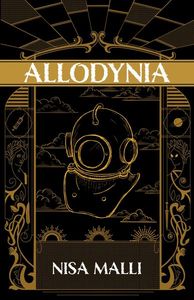"The List/ of Things I’ve Done/ for My Body is Too Long" Read an Excerpt from Nisa Malli’s Bold Poetry Debut, Allodynia
Allodynia, Nisa Malli’s follow up to her bpNichol Award winning chapbook, Remitting, is a tense, powerful collection that grabs the reader with razor-sharp, elegant forays into themes of pain and voice. Skipping from body horror to near future dystopias, Malli ruminates on the untranslatable; how we cannot truly understand or experience someone else's pain, how the future can only be understood in retrospect, how war is incomprehensible from within its midst.
Named for a condition in which everyday activities—even something as simple as combing one's hair—become painful, Malli's lyrics in the collection are bold and beautiful at once, bringing a melancholy wryness to her speaker's suffering, a glittering intelligence like a thin skin of ice over the deep, chilling isolation of living with pain.
We are proud to share an excerpt from Allodynia here today, courtesy of Palimpsest Press. These three poems are an enticing glimpse into a collection that represents an essential new voice in poetry.
Excerpt from Allodynia by Nisa Malli:
L’Hôpital Notre-Dame
The angels of the triage station know you
are waiting patiently to be admitted
into their sanctum. They won’t judge you for slumping
in the plastic waiting room chairs meant to hold one body at a time
that doesn’t need holding up, for wearing nail polish that dulls
the pulse oximeter suckling your finger, for mispronouncing
the names of your possible causes. Sweet Miracle, they know
you are a medical mystery, permitted to plead
your case here many times over. Ahead of you: an axe-split
kneecap, arrhythmias, the worst half of a bar fight,
food poisoning, a suicide risk, second degree burns.
The waiting room is eternal and atemporal. You have always
been here. They have always been here. Here, everyone is always
in the middle of an emergency, neither dying
nor recovered. The most urgent cases are already inside; the well
are well on their way home. It is daybright, no matter what
time it is. The loved ones are coming or trying to come
or calling the signal-less phones of the eventual patients. Here,
the doctors are spoken of but never seen, hidden somewhere
behind the ever-swinging doors. Here, the waiting
room occupants are swaddled for warmth
in the hum of hospital machines. Here, the hymns are sung
in sync to chest compressions. Here, the angels move
like refracted light bent between the aisles, floating two inches
off the ground in cloud-like white sneakers.
Floodplain
Tongue mossed over and algae blooming
my eyes, skeins
of pond scum knitting my hair. I’m at the bottom
of the lake, swallowing
the night’s pill, zipping myself into a numb
bed under the current. The list
of things I’ve done
for my body is too long
Your CanLit News
Subscribe to Open Book’s newsletter to get local book events, literary content, writing tips, and more in your inbox
to comb out and lay dry, so let
everything go to weeds: the shore walls
and the lake bed and the city’s
flood plans
unweaving around me. The collective
nouns for this
are all liquid. A flood
of pain. A drowning
of pain. A pummelling,
even underwater.
When Drought Dries Your Eyes
A diving bell too heavy to lift cups the bed
every morning. Small fires
you can’t put out wrestle your nerves
down to dust near-ground turbulence rolling
dendrites like tumbleweeds. A bulbar storm disinters
the atmosphere sometimes squall, sometimes
fever, sometimes full force gale. Diagnosis is half
superstition anyways empiricism plus
hope plus the placebo effect of naming
your enemy. Have you tried sheathing
lightning in the soft
bellows of your cheek gargling salt water
to read the residue? These sudden seasons
of drought and drowning
are enough to steal
your balance on the backhand.
Your doctors keep trying
to set up an internal anemometer. And you’re out here
in the weather station unsure if you should survey
the cloud ceiling or your tinder lungs.
____________________________________________________________
Excerpt taken from Allodynia by Nisa Malli, a poetry collection published by Palimpsest Press. Copyright 2022 by Nisa Malli. Reprinted with permission.
Nisa Malli is a writer and a researcher, born in Winnipeg and currently living in Toronto. She holds a BFA in Creative Writing from the University of Victoria and has completed residencies at the Banff Centre and Artscape Gibraltar Point. Her first chapbook, Remitting (Baseline Press), won the bpNichol Prize and her work has been nominated for a Rhysling Award and the Best of the Net Anthology.






